
Related
Community radio advocates are celebrating a major victory after the Senate approved the Local Community Radio Act on Saturday, one day after its passage in the House. The bill will open up more of the radio dial for Low Power FM, with the FCC now mandated to license thousands of new stations. We speak with Hannah Sassaman of the Philadelphia-based Prometheus Radio Project. [includes rush transcript]
Transcript
AMY GOODMAN: Today’s FCC vote on net neutrality comes just as community radio advocates are actually celebrating a major victory on Capitol Hill. On Saturday, the Senate approved the Local Community Radio Act, one day after its passage in the House. The bill will open up more of the radio dial for Low Power FM, with the FCC now mandated to license thousands of new stations. The measure repeals legislation that limited most Low Power FM stations to rural areas because large broadcasters claimed interference with their signals.
In a statement, the Prometheus Radio Project hailed the bill’s passage as, quote, “the first major legislative success for the growing movement for a more democratic media system in the United States.” It now heads to the White House for President Obama’s signature.
For more on the Local Community Radio Act, we’re joined here in New York by Hannah Sassaman, longtime organizer at the Philadelphia-based Prometheus Radio Project.
Welcome to Democracy Now! While we’ve heard about a major setback for media democracy advocates —
HANNAH SASSAMAN: Yeah.
AMY GOODMAN: — you have — are enjoying a major victory.
HANNAH SASSAMAN: Yeah, it’s really exciting, Amy, that at the 11th hour of the 111th Congress, that a bipartisan team of senators, of Congress members, realized that community radio was something that was long in coming, that so many people were fighting to get these stations in their cities in an era of media consolidation, when companies — frankly, like AT&T, like big broadcasters like Clear Channel — take so many of our voices off the air and just promote commercialism and just promote whatever their agendas are. This is an opportunity to truly put local people on the FM dial.
AMY GOODMAN: So, explain what happened. You’ve been fighting for this for 10 years. Prometheus Radio Project has been in this for the long haul.
HANNAH SASSAMAN: Sure.
AMY GOODMAN: Explain who was holding it back and how you trumped the National Association of Broadcasters.
HANNAH SASSAMAN: So, for 10 years, community groups have tried to get on the FM dial all over the country, but in 2000, when the FCC established the Low Power FM radio service — noncommercial 100-watt stations meant to put true community voices on the air — the NAB and other big broadcasters convinced Congress to limit Low Power FM to only very rural areas. So there wouldn’t be a Low Power FM in a city like Philadelphia, where the school district applied. The closest one would be in a city like Altoona, many hundreds of miles away. New Orleans didn’t get any stations. The closest LPFM is in Opelousas, Louisiana, licensed to a civil rights organization.
So, for 10 years, after a $2.2 million congressionally mandated Federal Communications Commission study proving that there was no interference from these 100-watt voices on the FM dial, we fought, we built a coalition as diverse as the Christian Coalition and the Leadership Conference on Civil and Human Rights, we got bipartisan senators and Congress members to support it. And by getting thousands of calls in from truly grassroots people into these senators’ offices, the NAB would try to get a senator to organize a secret hold blocking the bill. So time kept on running. We kept on worrying that we would lose. But then we would get everyone, from local Catholic leaders in Alabama to high schools in Wyoming, to call those senators, and they said people really want this service. There is no technical problem. The senators dropped their holds. The NAB was forced to negotiate. And now there’ll be thousands of stations around the country.
AMY GOODMAN: Now, explain exactly what LPFM is, Low Power FM.
HANNAH SASSAMAN: Sure. So, across the United States, there are full-power stations, you know, commercial stations, there’s public radio, and there’s something called Low Power FM. These are stations that broadcast about three to five miles, power of a light bulb, 100 watts. They are always local. You can’t really own one 5,000 miles away; you have to own one in your community. They’re always licensed to nonprofit community organizations. And you have to put some local content on the air.
They’re truly meant to ameliorate what happened in Minot, North Dakota in 2001, when a train went through town in the middle of the night, it derailed, it poured a poison gas cloud over the town. When the police tried to alert the emergency alert system, it didn’t work, because all six stations in town were owned by Clear Channel. They were being run on autopilot. And a huge amount of damage was done. So, Low Power FM is meant to put truly community voices on the FM dial. And now people around the country should get very excited, because we can now get ready to apply for these stations in our own communities, for civil rights groups, environmental organizations, immigrants groups. It’s a very exciting time.
AMY GOODMAN: How do people apply for these stations?
HANNAH SASSAMAN: So the FCC will open up what’s called a licensing window. We’re not sure exactly when. We at Prometheus are very excited to be working at the FCC to make a window happen as soon as possible. But now is the time to organize your group to think about what a community station can truly do in your town.
I love thinking about the Esperanza Peace and Justice Center in San Antonio. They fought to make sure that the golf association doesn’t build a course over their pure aquifer. They fought to protect the right to protest in the streets of San Antonio, and people are working across color lines, across gender lines, across class lines in that city. A local community radio station right there at the Esperanza Center will revolutionize their ability to make change. That’s what I’m hoping that the people of this country are ready to do.
AMY GOODMAN: NAB is run by the former senator Gordon Smith.
HANNAH SASSAMAN: Yes.
AMY GOODMAN: Who were this senators who were secretly putting holds on this?
HANNAH SASSAMAN: It was pretty interesting. Senator Smith and his friends at the NAB talked to Senator DeMint, Senator Coburn, Sessions of Alabama, both senators from Wyoming, Cornyn of Texas. But every single time those senators heard from local people, from, you know, local community leaders to the Red Cross, they would say, “Wait, people want this,” and they’d call up the NAB and say, “We’re dropping that hold.” This is a grassroots victory for media reform and for community organizing everywhere.
AMY GOODMAN: Well, I want to thank you very much for being with us. Apparently NAB now says they’re going to throw a party for the low community radio activists?
HANNAH SASSAMAN: Well, they want to gather us all together. It was — the thing is, Amy, is that when you look at radio, I think that the NAB thinks about everything from iPods to, you know, a Bluetooth, and they’re like, “Wait, free and local broadcasting — are we going to die? Are we on the outs?” When, if they sat down and thought about it, they could look at new Low Power radio stations and think about truly revitalizing their medium. We look forward to celebrating that with them.
AMY GOODMAN: Well, Hannah Sassaman, I want to thank you very much. When is this bill being signed?
HANNAH SASSAMAN: Well, we’re waiting anxiously to find out, but we’re assuming in the next few days. And then, local community radio for everyone.
AMY GOODMAN: Hannah Sassaman, longtime organizer with the Prometheus Radio Project, thanks so much for being with us.
HANNAH SASSAMAN: Thank you, Amy.

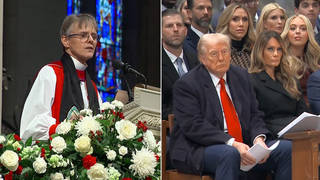
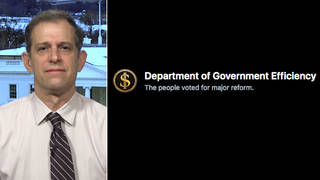
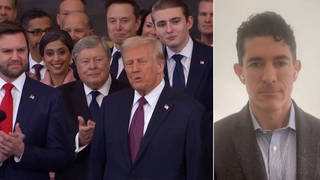
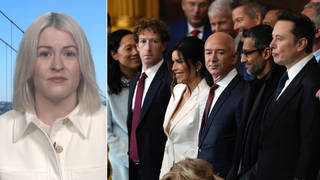





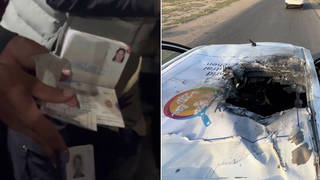
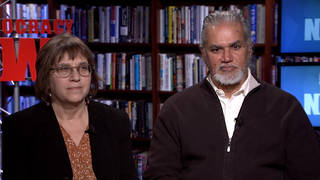
Media Options